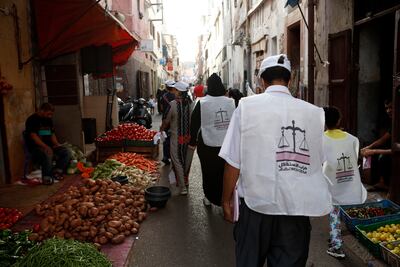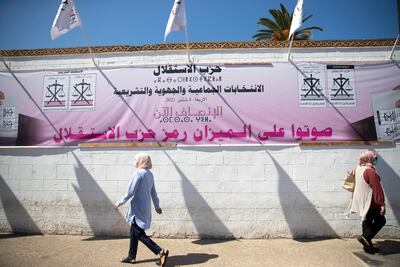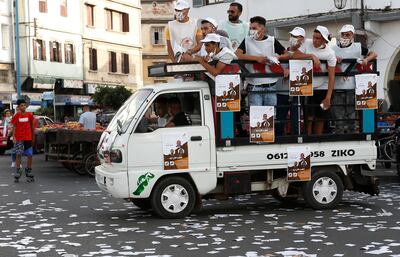Moroccans are preparing to cast their ballots on Wednesday in legislative, regional and local elections, all taking place on the same day.
The election, which comes as the country grapples with the economic impact of Covid-19 and as it faces down a spike in cases caused by the Delta variant, has been preceded by calls for a boycott from opposition groups under the pretext that their results are a foregone conclusion.
The moderate Islamist Justice and Development Party has been heading the government coalition since 2011 after winning two elections in a row.
Voter turnout in Moroccan elections is usually below 50 per cent. In the 2016 election, it was about 43 per cent - 2 per cent lower than what was seen in 2011.
Official figures show that about three million young people between 18 and 22 registered to vote for the first time this year, making up about 11.9 per cent of the total number of eligible voters in the country.

Eighteen million eligible voters will elect candidates from 31 political parties and coalitions for 395 seats in Parliament on Wednesday. They will also be selecting representatives for 678 seats on regional councils.
Of those The National spoke to, several first-time voters said they were enthusiastic about playing a role in democracy.
“Boycotting is not effective. It doesn’t allow us to uproot corruption,” said 19-year-old Achraf Amrdo, who works at a bakery and is a member of the Unified Socialist Party.
The first-time voter added he felt happy “because he would be using his vote to stop those who steal public funds”.
Morocco’s 2020 Corruption Perception Index is 40 points, one point less than 2019, reported Transparency International, citing a lack of government accountability and significant risks for mismanaged funds and corruption.
But some see the elections as a healthy test for whether political parties can keep their promises.
Sixty-year-old Fouzia Ait Sghyer said that she would be taking part in the election for the first time on Wednesday.
“For me, it’s a mere experiment. I will see if the party I will vote for will be able to provide education and health care for us or not. Afterwards, I will decide if I will continue to cast my ballot in future elections or not,” she said.

This year’s election is also an experiment for officials, taking place after sweeping reforms to the process. One such change is the way votes will be calculated: on Wednesday the number of seats in Parliament will be allocated based on the total number of eligible voters, rather than the number of those who actually cast their ballots.
The government has also removed the requirement for parties to reach at least 3 per cent of the national vote to win a seat.
These changes aim to reduce the ability of big parties to control Parliament, especially the ruling Freedom and Justice Party, while giving more opportunities to smaller groups.
The reforms, however, do not seem to have changed the position of those in the boycott camp.
“I boycott elections because the supervisory body is not independent. Moreover, why would I give my vote to a party that is incapable of making decisions, despite heading the government? The elections in Morocco do not lead to institutions that rule,” said 27-year-old Saber Imdanyen, the head of the National Union for Moroccan Students.
“I am politically active but I never take part in elections,” he said.

Morocco adopted a new constitution in 2011 in response to the February 20 Movement, the local version of the Arab uprisings. The step brought the country closer to a system of constitutional monarchy, but, in reality, the king has the final say.
For 21-year-old Nouhaila Hafid, who is taking part in the election for the first time as both a candidate and a voter, voting is her chance “to have a say in my life path and in the big choices my country will make in the coming years".
“I didn’t use to be interested in politics but after a while, I realised that this was wrong … [Voting] is like laying the first stone in a project that you drew up yourself,” said Hafid, who is running for a seat in the Local Council of Marrakech on the ruling Justice and Development Party’s list.
This story was written in collaboration with Egab.











